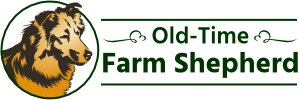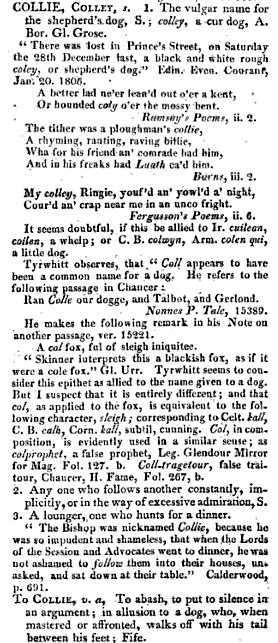
There has been a good deal of discussion on the name of our dog breed, the “Scotch Collie.” Is it appropriate? Is it outdated? Should they instead be called “Scottish Collies” or something else? In this article I will discuss how our breed name was decided upon and some of the other options that were considered.
“Scotch Means Whiskey”
This is a commonly used statement from persons who want to detract from the label Scotch Collie or to argue for Scottish Collie. It is true the Scotch is properly whiskey, but that is in reference to “scotch” used as a noun, the term Scotch Collie uses “scotch” as an adjective which any English dictionary will tell you means Scottish. Dictionary.com adds the following interesting footnote on this usage:
The natives of Scotland refer to themselves as Scots or, in the singular, Scot, Scotsman, or Scotswoman. The related adjectives are Scottish or, less commonly, Scots. Scotch as a noun or adjective is objected to by the Scots except when used of whisky and in established phrases like Scotch egg and Scotch pine.
Dictionary.com
Although some people may not be aware of it because it is an old term, the term “Scotch Collie” is a long established phrase just like Scotch eggs, pines and whiskey. It’s usage going back at least to the early nineteenth century.
What does collie mean?
In the early 1800s the name “collie” or “colley” as it was often spelled in those days, was not widely known or used outside of Scotland. People who wrote about these dogs, most of whom were English, used the term “Scotch Shepherd”, “Scotch Shepherd’s Dog”, “Scotch Sheep Dog” or “Highland Sheep Dog” this to differentiate them from the then common English Sheep Dog (not the Old English Sheepdog, but the forerunners of today’s English Shepherd, a close relative to the Scotch Collie). As time passed and people became more familiar with the Scottish dog, the term “collie” became more and more common in English writing until by 1860 the terms “Scotch Collie”, “Highland Collie” or just plain “Collie” had become commonplace.
The term “Scotch Collie” was really only in everyday use from about 1860 to 1930, before that it was different things and of course the Scottish people themselves never called it a Scotch Collie, to them it was just a collie. The “Scotch” part was added by the English to designate the origin of these dogs in Scotland. I have never seen the term “Scottish collie” in use during that period although indeed the meaning is identical.
Choosing a Name
Today there is a confusing jumble of names related to the old fashioned type of collie dog, allow me to attempt to untangle this mess.
Scotch Collie
The old fashioned name for the original collie dog, Scotch Collie went out of vogue about 70 years ago, largely replaced by the term “Rough Collie”. It is sometimes derided because the term “scotch” has fallen out of favor in Great Britain in favor of Scots or Scottish but as detailed above, using Scotch as an adjective in terms with historical context is considered acceptable. J. Richard McDuffie avoided this term for his dogs which were quite clearly of Scotch Collie ancestry because of its association with the long nosed show type dogs, today few people associate kennel club collies with the old fashioned term Scotch Collie.
Farm Shepherd
Farm Shepherd was the name used by Mr. McDuffie (see Scotch Collie above) to describe his dogs to avoid using the term “Scotch Collie”. Unfortunately this term has its own issues, for one it is needlessly ambiguous, as any dog that cares for sheep can be termed a “shepherd” and most Americans think ‘German’ when they hear “shepherd” associated with a dog. Dusty Copeland, a breeder in California called her dogs “Farm Shepherds” and they have no collie blood in them at all.
Farm Collie
Often characterized as the “old type of collie”, however printed references to “Farm Collie” being used before the farm collie movement began in the 1990s are scarce. This term has come to mean whatever the speaker wants it to mean and is applied to everything from English Shepherds to Border Collies to old fashioned looking Rough Collies. Since the name means everything, it unfortunately means nothing.
Scotch Shepherd
Scotch Shepherd is a commonly used name for the Collie which predates the term Scotch Collie. In the past I have advocated for the use of this term because it avoids the ambiguity of “farm collie” and “farm shepherd” while clearly differentiating Scottish dogs from English dogs. A friend and fellow breeder pointed out that the term “shepherd” is undesirable since it does not clearly say “collie” to people and instead often conjures up images of German Shepherds.
Scottish Collie
Not a bad term really but a bit ambiguous because all it really says is that this is a Collie of Scottish origins, which could be said of any Collie dog. In contrast the term Scotch Collie (even without the addition of “old-time”) implies old fashioned because it is an historic term that was used extensively in the golden age of these dogs from 1860 to 1930. There is very little historical precedent for using Scottish Collie although there is no particular reason it should not be used other than its ambiguity.

Why worry about the name?
Why, you may ask, does any of this matter? Because we need a unified message to help promote this breed and the term “farm collie” is too vague and does not distinguish between English “shepherds” and Scottish “collies”. As a group of people working to promote these dogs we should first agree on a name, then consistently apply that to the breed organization, registry and other breed infrastructure important to preserving these dogs.
The decision to call the breed “Old-Time Scotch Collie” was not made lightly. I personally liked “Scotch Shepherd” because it is historical and because shepherd indicates the breed’s working ability, but I also agreed with the point above that it can also be unclear. I also liked the name Scotch Collie but argued to make a differentiation from the non-working, show type dogs, maybe by adding “old” or “working” to the title as in “Old Scotch Collie” or “Working Scotch Collie”. I even considered the idea of using the old fashioned spelling “Colley” to set them apart from show collies.
In the end, with lots of input of other breeders, we decided on using the term “Old-Time Scotch Collie” to refer to these dogs because it has historical precedent, clearly says what it is to most people and avoids the over ambiguous “farm collie”. The phrase “old-time” is shorter than “old-fashioned” and saves a syllable while paying homage to Richard McDuffie’s “Old-Time Farm Shepherd” which was our antecedent.
If you would like to learn more about early Collies check out this post showing paintings of Scotch Collies in the mid 1800s.















I grew up with these Collies, worked by a second generation dairy farmer – my mom, whose dogs descended from her father’s bitch, brought to Canada in the early 1900s. She called our dogs Scotch Collies, and that was because they were soft enough to work the milking cows without causing unwanted tension. They were incredible family dogs and I have since not met a purebred specimen of any breed to match. If I had a vote it would be “Working Scotch Colley”.
Arlene
Thanks for adding your personal story and for the comment.
Thanks for your thorough research. We adopted an ES from the pound. He was labeled as an Australian Shepherd, but clearly was not. Your work has helped us understand our dog a lot better.
I like Scotch Collie or Working Scotch Collie. I believe that the folks of Scotland might like Scots Collie.
Paul
Thanks for your comment. I would love to see pictures of your dog.
Shep
I grew up in Eastern Ohio and we had a Scotch Collie/Shepherd mix. The Scotch Collie was a Gold and White beauty and the Shepherd was a handsome Dark Brownish-Black. He was not a German Shepherd, nor was he a Collie. He looked quite different than both. He looked exactly like a Shepherd my Mom had as a child.
There were Shepherds and Scotch Collies and you couldn’t mistake one for the other.
When you cross them, you get absolute perfection. Strong, and protective with problem solving skills and amazingly good health. So perfect that everyone in the valley had one or wanted one.
I should have added this to my previous comment…
Where I grew up there existed at the same time both Scotch Collies and Collies. They looked similar, but not the same. Scotch Collies to me looked more like the English Shepherd. Collies were what people would now call a Rough Collie. In the 1970’s -1980’s, my cousin had a Collie and I had a Scotch Collie/Shepherd mix.
This article is farcical. You are not a Scot, you don’t have a say in it, and you are only rationalizing using an outdated term. Would you call an African American by any of the ways that used to be popular in the United States? Then why do you persist on using terms the Scottish would not themselves use and would consider offensive? The only thing you are assuring by using this name, is that however popular your dogs get anywhere in the world, they will never catch on in Scotland.
You don’t know my ancestry who are you to judge? The university affiliation on your email pretty much says it all to me. It seems higher education is all about teaching people to be offended by words these days.